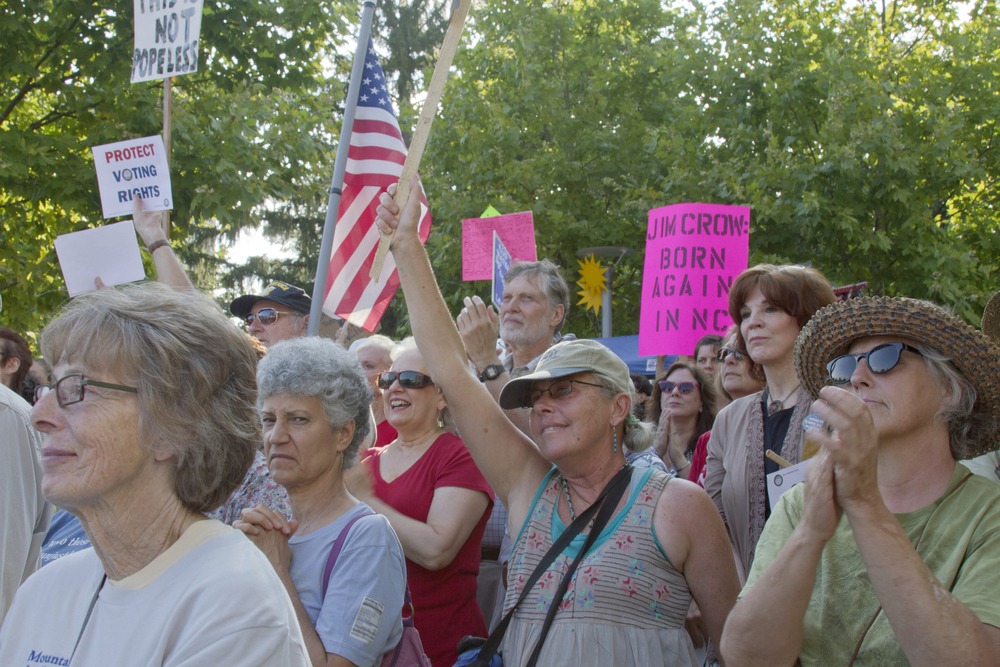
July 9, 2015; The Hill
This week, the NAACP will be taking on the government of North Carolina in a legal challenge to the Tar Heel State’s restrictive voting rights legislation, or, probably better put, the state’s legislation to restrict voting rights. In the wake of the Supreme Court’s invalidation of Section 4 of the Voting Rights Act, Southern states such as North Carolina went to town to enact voting laws that ordinarily would have required the review of the U.S. Department of Justice and in many cases might not have passed civil rights muster.
An article in Charlotte’s black newspaper, the Charlotte Post, described in a nutshell the comprehensive restrictions in the state’s voting rights law:
“The Advancement Project, a multi-racial civil rights group, called H.B. 589 a ‘monster’ bill that shortens the early voting period by a full week, eliminates same-day registration, requires strict forms of voter ID, resources that disproportionately affect minority and low-income voters. The bill also blocks out out-of-precinct voting and expands the ability to challenge voters at the polls, and ends a pre-registration program for 16- and 17-year olds.”
Advancement Project attorneys who will appear in court in the trial plan to argue that the state legislature was fully aware of the racial implications of the law, that it would result in lower black voter registration and turnout; for example, 41 percent of North Carolina blacks participating in the 2012 elections used same-day registration, a practice that the state’s new voting rights law would prohibit. The North Carolina statute may be, according to the Advancement Project’s Penda Hair, the worst voter suppression law in the nation.
Sign up for our free newsletters
Subscribe to NPQ's newsletters to have our top stories delivered directly to your inbox.
By signing up, you agree to our privacy policy and terms of use, and to receive messages from NPQ and our partners.
With civil rights organizations such as the nonprofit Advancement Project leading the charge, you would think that the voting rights movement couldn’t lose, but there are tough issues to confront in both the courts and in political organizing. The NPQ Newswire and the Cohen Report have both devoted much space to the work of voting rights advocacy organizations, including a very candid interview with Judith Browne Dianis, the co-director of the Advancement Project, on the path that the voting rights movement has had to navigate from Bloody Sunday in Selma to today’s crop of voter ID laws. The voting rights path was hardly helped by the Supreme Court this past spring when it allowed the Wisconsin voter ID law to go into effect.
The other co-director of the Advancement Project, Penda Hair, wrote a piece for The Hill that puts the North Carolina case in the context of what nonprofits and community leaders should be doing to overturn these laws given the Wisconsin decision. Although the court has nixed Section 4 of the Voting Rights Act, Section 2 still “bans voting practices that discriminate on the basis of race, (though) it is enforced only through lawsuits.” That means nonprofits have to pursue a two-part structure: litigation to show that laws like North Carolina’s are harmful to people of color combined with political organizing targeting state legislatures, as North Carolina advocates have done with their “Moral Mondays” protests and marches.
The strategy is difficult in a number of ways. Litigation is often long and costly, and the number of foundations willing to support a litigation strategy that could consume years is pretty limited. Moreover, although it should be good enough simply to demonstrate the significantly disproportional adverse impacts on the voting rights of persons of color, the willingness of so many North Carolina legislators to acknowledge their racial intentions will help the Advancement Project make its case in court; the vocal intent of legislators to use voter ID laws to suppress black voter registration and turnout is helpful in court strategies, but legislators in other states may not have been quite as open as some North Carolina lawmakers were about their motivations. The political organizing strategy related to litigation is sometimes complex in and of itself. It is difficult to keep the community fully and effectively engaged while the battle enters the courtroom and stays there and the conversations remain among lawyers.
The voting rights problem is found in more than just Southern states. Recently, New Jersey Governor Chris Christie threated to veto a voting rights bill, the Democracy Act, which would make voter registration automatic for people getting their drivers licenses, permit people to register online to vote, and establish two weeks of “early voting.” There is voting rights litigation and organizing to be pursued in states beyond the Deep South.
In light of the Supreme Court decision, more states will take stabs at disenfranchising black voters. If nonprofits recall that their deep down core mission, protecting democracy, is what unites most nonprofits, they will quickly perceive that their efforts to enhance and expand voting rights is a cross-cutting civil rights issue, just as the removal of the Confederate battle flag was for South Carolina Governor Nikki Haley, who led the charge to remove the banner from South Carolina’ statehouse. The Confederate flag was and is a symbol of our nation’s sad history of racial hatred. Voter ID laws like North Carolina’s are as well, and like the flag should be overturned by state legislators — or, if they won’t do it, then by the federal courts. —Rick Cohen












